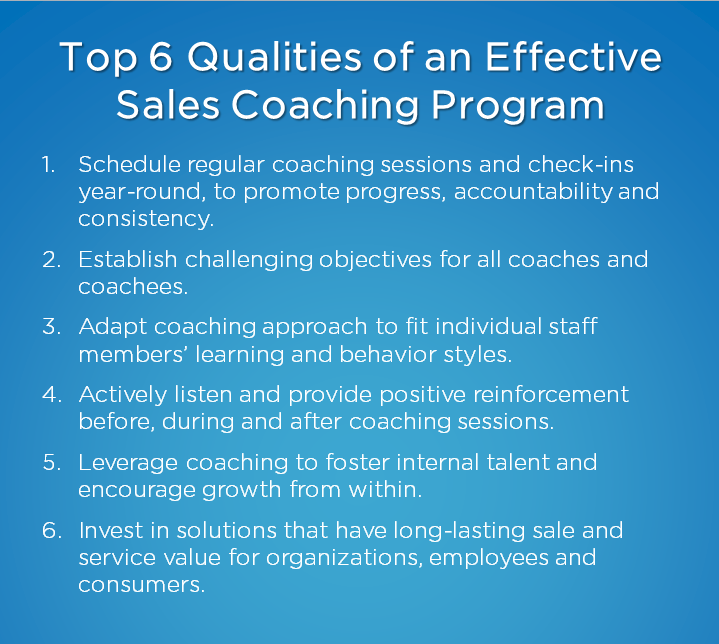This blog first appeared on CUInsight.
According to a 2018 research study performed by Sales Management Association, there is as much as an 18% gap in sales revenue achievement between companies with strong sales coaching strategies vs. those that have less successful – or non-existent – coaching practices in place.[1]
Proper leadership and support is vital to the success of any individual or team. Even the most recognizable luminaries of our time – Jeff Bezos, Oprah Winfrey, Steven Hawking – had mentors to help nurture and build their talent over time.
With the dedicated leaders and coaching strategies in place, your organization can:
- Spot and foster talent and potential in people
- Hold staff accountable to high performance and productivity
- Hold managers accountable for consistent, quality, 1 on 1 coaching
- Improve communication skills and strengthen relationships
Watch the On-Demand Webinar: The Secret to Effective Sales Coaching: Focus on People, Not Products.
Building a long-term coaching strategy may seem like a major undertaking, but the most effective coaching strategies have long-lasting impact that far overshadows any time or resource required upfront.
Overcoming Coaching Obstacles
Of the organizations that reported subpar sales coaching practices in the 2018 Sales Management Association study, nearly all of them admitted that they recognize value in strengthening their coaching practices, but are unable to prioritize the need.
The three biggest obstacles we hear are keeping sales organizations from adopting consistent coaching strategies are:
- Lack of time
- Inexperienced or unconfident sales staff
- Unmotivated sales staff
Up front, these may seem like difficult challenges to overcome. However, establishing a strategic sales coaching program can address and strengthen each of these three areas, and here’s how -
- Coaching Can Buy Back Time
Time is seen as a two-way constraint: it’s a challenge for managers to find the time to coach, and it is an impediment to the actual work time of sales staff. However, organizations that spend roughly 9 hours per week coaching see an average 7% growth in sales, according to Sales Management Association’s 2018 report. Coaching may take some time up front, but in the long-run it can vastly reduce the time needed for supporting unproductive employees. - Coaching Can Build Skills and Confidence
If the proper coaching and training is not offered at an organization, then employees are much less likely to ever build the skills or confidence needed to consistently sell products. On the flip side, providing training and coaching within your organization can increase employee self-confidence by as much as 81%, and work performance by as much as 70%.[2] - Coaching Can Motivate Staff
According to a study by Gallup, only 34% of U.S. employees are engaged in their jobs.[3] A feeling of purpose within an organization is vital to being engaged. Proper, regular coaching can instill in your employees a sense of belonging and potential, which in turn will likely result in increased confidence, self-accountability and productivity throughout your sales force.
Learn more about our Leadership Coaching programs.
When done right, coaching can have long-lasting impact on sales organizations. It may take some time upfront to build, but this initial time investment is nothing compared to the long-term payoff your business, staff, and bottom-line is likely to experience from a proper coaching strategy.
So what coaching strategies have proven to be most effective in achieving this long-term sales success?
Building a Successful Sales Coaching Strategy
In our 40+ years of working with sales organizations, we have found that the strongest coaching and development programs incorporate these four main components:
- Offering training solutions and tools that bolster skills and confidence
- Measuring performance to identify and nurture growth
- Finding the right incentives to stimulate performance and motivate staff to achieve goals
- Prioritizing coaching at every level of the organization, from the C-Suite to the front line
To get the most of your coaching program, you should also adopt practices that aim to consistently engage, encourage, and motivate sales staff. Here are some practical tips for doing so:

Developing strong coaches to guide and maximize the potential of your sales people is central to creating a consistent, consumer-centric sales culture. And a focus on refining the skills of your sales team will allow your organization to reach its goals.
Help your sales managers become confident and effective leaders by arming them with the proper knowledge and resources. Contact us to learn how we can help you can take your organization’s sales culture to the next level without sacrificing integrity.
[1] “Full Research Report: Sales Coaching Practices.” Sales Management Association, 15 May 2018, https://salesmanagement.org/resource/sales-coaching-practices/full-research-report-sales-coaching-practices/.
[2] “EBook: Who Will Your Superstars Be in a Year? Your Coaching Game Plan.” Integrity Solutions, 25 May 2018, www.integritysolutions.com/insights/ebooks/ebook-will-superstars-year-coaching-game-plan-2.
[3] “Employee Engagement on the Rise in the U.S.” Gallup, Inc., 26 Aug. 2018, https://news.gallup.com/poll/241649/employee-engagement-rise.aspx.
